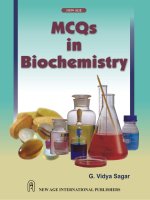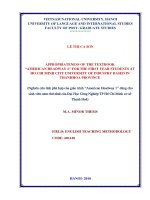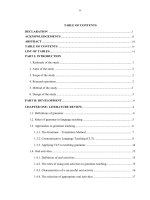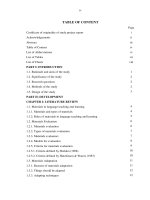Đánh giá giáo trình intelligent business, trình độ cơ bản dành cho sinh viên không chuyên tiếng anh năm nhất học viện tài chính; những gợi ý trong việc chỉnh sửa và sử dụng giáo trình
Bạn đang xem bản rút gọn của tài liệu. Xem và tải ngay bản đầy đủ của tài liệu tại đây (269.66 KB, 8 trang )
VIETNAM NATIONAL UNIVERSITY, HANOI
UNIVERSITY OF LANGUAGES AND INTERNATIONAL STUDIES
FACULTY OF POST-GRADUATE
ĐOÀN THỊ THỦY
AN EVALUATION OF INTELLIGENT BUSINESS - ELEMENTARY
FOR THE FIRST YEAR NON-ENGLISH MAJOR STUDENTS AT
ACADEMY OF FINANCE; SUGGESTIONS FOR BOOK USE AND
ADAPTATION
(Đánh giá giáo trình Intelligent Business, trình độ cơ bản dành
cho sinh viên không chuyên tiếng Anh năm nhất Học viện Tài
Chính; những gợi ý trong việc chỉnh sửa
và sử dụng giáo trình )
MINOR PROGRAM THESIS
FIELD: ENGLISH TEACHING METHODOLOGY
CODE: 60140111
HÀ NỘI – NĂM 2015
VIETNAM NATIONAL UNIVERSITY, HANOI
UNIVERSITY OF LANGUAGES AND INTERNATIONAL STUDIES
FACULTY OF POST-GRADUATE
ĐOÀN THỊ THỦY
AN EVALUATION OF INTELLIGENT BUSINESS - ELEMENTARY
FOR THE FIRST YEAR NON-ENGLISH MAJOR STUDENTS AT
ACADEMY OF FINANCE; SUGGESTIONS FOR BOOK USE AND
ADAPTATION
(Đánh giá giáo trình Intelligent Business, trình độ cơ bản dành
cho sinh viên không chuyên tiếng Anh năm nhất Học viện Tài
Chính; những gợi ý trong việc chỉnh sửa
và sử dụng giáo trình )
MINOR PROGRAM THESIS
FIELD: ENGLISH TEACHING METHODOLOGY
CODE: 60140111
SUPERVISOR: Assoc. Prof. Dr. NGUYỄN VĂN ĐỘ
HÀ NỘI – NĂM 2015
DECLARATION
I hereby state that I, Doan Thi Thuy, being an M.A candidate of the Faculty of
Postgraduate, University of Languages and International studies, Vietnam National
University, Hanoi certify my authorship of the thesis submitted today entitled:
“An Evaluation of Intelligent Business – Elementary for the first year nonEnglish major students at Academy of Finance; Suggestions for book use and
adaptation–
The thesis is the study of my own work and substance of the thesis has not, wholly
or in part, been submitted for a degree to any other universities or institutions.
Hanoi, October, 2015
Doan Thi Thuy
1
ACKNOWLEDGEMENTS
In my exploring of knowledge and in the course of completing this thesis, many
individuals have assisted me. I would like to acknowledge wholeheartedly their
assistance, cooperation and encouragement which all contributed to make this study
completed. This thesis would not have been feasible without their guidance and help
of which in one way or another rendered their valuable assistance during the whole
process of carrying out and completing this study.
First and foremost, I would like to express my utmost gratitude to my supervisor,
Assoc. Prof. Dr. Nguyen Van Do for his precious guidance and constructive
criticism from the start of my work. He has constantly provided me with
encouragement and support. I would not have made steady progress without his kind
support. It is an honor for me to have his guidance as a supervisor to complete my
thesis.
Second, I owe special thanks to the first year non-English major students at
Academy of Finance for their enthusiastic participation throughout my research.
Without their patience, cooperation and attention, this study could have never been
completed.
I also wish to thank all my colleagues at Academy of Finance who are the subjects
of my thesis for their willingness to answer the questionnaire and interview. Without
their help, I could not have finished the thesis.
Last but not least, I also owe a deep debt of gratitude to my beloved friends and
family members for their unfailing encouragement and valuable support until the
completion of this research.
2
ABSTRACT
Course books have played an important role in most language programs. However,
they are not always professionally designed and do not always fit the curriculum
and closely correspond with the objectives of the course and the needs of the
students. Within this regard, the thesis was conducted with the aims to evaluate the
suitability of the material “Intelligent Business Elementary” for the first year nonEnglish major students at Academy of Finance to investigate the suitability of the
course book to the students’ needs and interests, then to suggest practical
recommendations for future improvements of the material. The data collection
instruments employed in this study were questionnaires for teachers and students,
and informal teachers’ interviews. In this thesis, the material is analyzed based on
the criteria proposed by Hutchinson & Waters (1987). After investigating some
strengths and weaknesses of the material, the author comes to the conclusion that
the material well responds to students’ needs and interests.
Thanks to the findings, suggestions would be given for better application of the
material through adaptation techniques like addition, deletion, replacement, and
reorder and combination.
3
REFERENCES
1. Allwringt, R.L. (1981), What do we want teaching materials for? ELT Journal,
36(1), pp 5-18
2. Brown, J.D. (1995), The Elements of Language Curriculum. Boston: Heinle &
Heinle Publishers.
3. Cunningsworth, A. (1995), Choosing your coursebook. London: Macmillan.
4. Dudley- Evans, T.,& St John, M.J.(1998), Development in English for Specific
Purposes, Cambridge: Cambridge University Press.
5. Ellis,R.(1997), The Empirical Evaluation of Language Teaching Materials. ELT
Journal, 51(1), pp.36-42.
6. Garielatos, C. (2000), Course book as a flexible tool, Issue in ELT: persistent
problems, practical solutions. TESOL Special event, Hellenic American Union,
Athens, Greece
7. Harmer, J. (1996), The Practice of English Language Teaching, Longman
8. Huong, N.T.M (2013), An evaluation of EBP material “ English in economics
and business” for economics and business management students in Hanoi
university of Mining and Geology. Unpublished Master Thesis, English Teaching
Methodology 601410, Combined Programme.
9. Hutchinson, T., & Waters, A. (1993), English for specific purposes, Cambridge:
Cambridge
10.
University Press.
Hutchinson, T., & Waters, A. (1987), English for specific purposes: A
learning- centred approach, Cambridge: Cambridge University Press.
11. Iacovos Tsiplakides.(2011), “Select an English book: theory and practice”, theory
and practice in language studies, vol. 1, No.7, pp 758-764
12. McDonough, J., & Shaw, C. (1993), Materials and Methods in ELT, Blackwell
13. Minh,N.T.T. (2007), The case of English textbooks currently in use in
Vietnam’s upper-secondary schools. Seameo Regional Language Centre
4
14. Nhan, T. T. (2006), An Evaluation of The Textbook “Oxford English for
Electronics” and Suggestions for New Materials Design. Unpublished Master
Thesis, English Teaching Methodology 601410, Combined Programme.
15. Nunan, D. (1988), the Learner- centered curriculum, Cambridge University
Press.
16. Oanh,T.T.C (2010), An evaluation of the material “Lifelines” for the first nonEnglish major students at Hai Phong university. Unpublished Master Thesis,
English Teaching Methodology 601410, Combined Programme.
17. Richards, J.C. (2001), Curriculum Development in Language Teaching,
Cambridge: Cambridge University Press.
18. Robinson, P.C. (1991), ESP today: A practitioner’s Guide, London: Prentice
Hall.
19. Sheldon, L.E. (1998), Evaluating ELT textbooks and materials, ELTJ, 42(4),
pp. 237-46.
20. Tomlinson, B. (1998), Materials development in language teaching,
Cambridge. CUP
21. Tomlinson, B. (2001), Connecting the mind: a multi-dimensional approach to
teaching language through literature, The English teacher, 4(2), pp. 115-105
22. Tomlinson, B. (eds), Materials Developments in Language Teaching,
Cambridge: Cambridge University Press, pp 202-192.
23. Williams, D.(1983), Developing Criteria for Textbook Evaluation, In ELT
journal,37(3).
5
I









